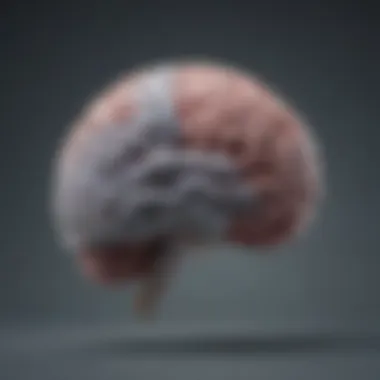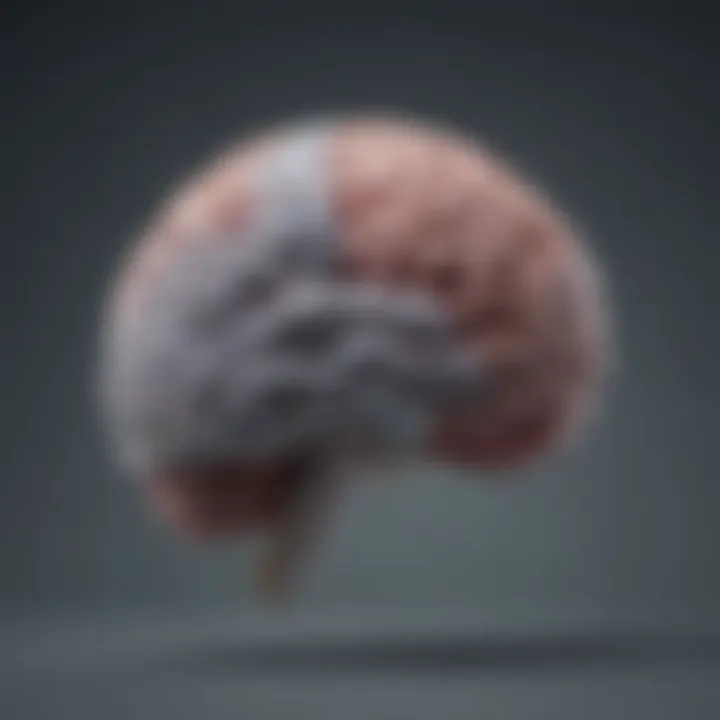Harnessing Nootropics for Effective Anxiety Relief


Understanding Mental Health and Well-being
Anxiety disorders are among the most common mental health challenges globally. To effectively manage anxiety, it is essential to understand the underlying aspects of mental health. Mental health refers to our cognitive, emotional, and social well-being. It affects how we think, feel and behave in daily life.
What is Mental Health?
Mental health encompasses emotional balance, effective communication, and the ability to manage stress. The World Health Organization defines mental health as a state of well-being in which an individual realizes their abilities, can cope with normal stresses of life, can work productively, and can contribute to their community. Mental well-being is multifaceted, involving biological, psychological, and social components.
The Importance of Prioritizing Mental Well-being
Prioritizing mental health is crucial for a fulfilling life. It influences how we handle stress, relate to others, and make choices. A stable mind can enhance productivity and enhance interpersonal relationships. Neglecting mental wellness may lead to serious repercussions, including anxiety and depression. In turn, this creates a cycle that can be hard to break.
Common Mental Health Challenges and Disorders
Anxiety can manifest in many forms, including generalized anxiety disorder, panic disorder, and social anxiety disorder, among others. These conditions can interfere with day-to-day life, creating a need for effective coping mechanisms. The relationship between mental health and nootropics is gaining attention as a potential avenue for alleviating anxiety symptoms.
Strategies for Improving Mental Health
Managing anxiety effectively calls for a multi-faceted approach, taking into account personal habits, professional guidance, and support systems.
Self-care Techniques and Practices
Self-care involves activities that promote physical and emotional well-being. Some methods include:
- Regular physical exercise
- Adequate sleep
- Engaging in hobbies that bring joy
- Limiting screen time, especially before sleep
Building Resilience and Stress Management
Developing resilience aids in managing stress. Techniques like mindfulness and journaling can help individuals process emotions. Recognizing triggers promptly can lead to proactive coping strategies, enhancing emotional regulation.
Seeking Professional Help: Therapy and Counseling
Professional assistance can provide valuable tools and techniques tailored to individual needs. Therapy, such as cognitive-behavioral therapy (CBT), has shown effectiveness in treating anxiety. Furthermore, discussing one’s challenges with a mental health professional can lead to better understanding and relief.
Finding Balance in Life
Creating balance in life is critical for mental wellness. This balance can come from healthy lifestyle choices and the cultivation of coping skills.
Healthy Lifestyle Choices: Diet, Exercise, and Sleep
A balanced diet can enhance brain function. Nutrient-rich foods may help in stabilizing mood and reducing anxiety symptoms. Regular exercise triggers the release of endorphins, which help improve mood. Additionally, good quality sleep is essential for mental clarity and emotional equilibrium.
Mindfulness and Meditation Practices
Mindfulness practices can ground individuals in the present moment. Techniques like meditation, breathing exercises, or yoga can facilitate relaxation, reducing anxiety symptoms over time. Many people find that incorporating these practices into their daily routine can lead to significant mental health improvements.
Setting Boundaries and Managing Time Effectively
Clear boundaries help maintain mental health. It is important to know when to say no, whether it be regarding work responsibilities or social commitments. Additionally, managing time through prioritization can reduce the feeling of being overwhelmed.
Enhancing Personal Development
Personal development is an ongoing process that can contribute to better mental health, especially in relation to anxiety.
Goal Setting and Productivity Tips
Effective goal-setting involves creating achievable and measurable objectives. Breaking larger goals into smaller, manageable tasks can make them less daunting and more achievable, which can, in turn, mitigate anxiety surrounding performance.
Building Healthy Relationships and Social Connections
Nurturing social connections is vital. Healthy relationships offer support during tough times. Engaging with others can provide comfort and relieve feelings of isolation.
Practicing Gratitude and Positivity
Practicing gratitude helps shift focus from negative thoughts to positive ones. Keeping a gratitude journal allows individuals to appreciate small victories and moments of joy, fostering a more optimistic and content mindset.
Tips for Maintaining Mental Well-being
To sustain mental well-being, individuals can employ various strategies to navigate life's challenges effectively.
Strategies for Preventing Burnout


Burnout can occur due to prolonged stress. Setting realistic expectations, taking regular breaks, and ensuring time for leisure activities are essential steps toward prevention.
Coping with Challenges and Setbacks
Life is filled with ups and downs. Learning to cope with setbacks is vital. Techniques such as reframing thoughts positively can help individuals manage difficulties more adeptly.
Creating a Supportive Environment
Surrounding oneself with a supportive environment can enhance mental wellness. This includes both physical space and social circles that are encouraging and understanding.
Understanding and managing mental well-being is a continuous journey. Integrating nootropics into this journey may complement traditional methods and offer further relief in dealing with anxiety.
Understanding Anxiety
Understanding anxiety is crucial for identifying effective management strategies, including the exploration of nootropics. Anxiety affects millions and can lead to significant disruptions in daily life. It is essential to comprehend its nature, types, and symptoms to better address the treatment pathways available.
Anxiety is not just a fleeting worry; it can develop into pathological states. Grasping the dynamics behind anxiety enables better application of various nootropic substances as potential assists in calming the mind and enhancing cognitive function. This understanding helps to identify which nootropics could have a beneficial role in alleviating anxiety symptoms, thus equipping individuals with the knowledge to make informed choices regarding their mental health.
Definition of Anxiety
Anxiety can be defined as a feeling of unease, such as worry or fear, which can be mild or severe. It is a natural human response to stress, but when it becomes persistent, it may develop into an anxiety disorder. Understanding the essential nature of anxiety allows us to recognize when it transitions from a typical response to a debilitating condition.
Types of Anxiety Disorders
Generalized Anxiety Disorder
Generalized Anxiety Disorder, or GAD, is characterized by excessive, uncontrollable worry about various issues. This type of anxiety disorder can be pervasive and is often chronic. The key characteristic of GAD is its unpredictability and lack of specific triggers, making it a relevant focus in discussions about anxiety management. The chronic worry can often hinder daily functioning and make it necessary to seek effective treatment options. Nootropics, which may help to enhance mental clarity or reduce stress, could be considered as a possible avenue for alleviation.
Social Anxiety Disorder
Social Anxiety Disorder involves intense fear of social situations, driven by the worry of being judged or embarrassed. This disorder's key aspect is the avoidance of these situations, which can severely limit the individual's social life and opportunities. Understanding this disorder helps in identifying how nootropics might assist in reducing the fear response, thus enabling participation in social environments with greater ease. A potential advantage of employing nootropics here is the opportunity for enhanced focus and relaxation in social interactions.
Panic Disorder
Panic Disorder is marked by sudden and repeated attacks of fear that last for several minutes. During these panic attacks, individuals may feel as if they are losing control or even experiencing a heart attack. The primary characteristic of this disorder is the unpredictability of the attacks, contributing significantly to ongoing anxiety about when the next one might occur. This chronic fear can be debilitating, and nootropics may offer opportunities to lower overall anxiety levels, thus potentially reducing the frequency or intensity of panic attacks.
Post-Traumatic Stress Disorder
Post-Traumatic Stress Disorder, or PTSD, arises after experiencing or witnessing a traumatic event. The key feature of PTSD is the recalcitrance of distressing memories, flashbacks, or nightmares. Those with PTSD often experience significant anxiety in response to triggers related to the trauma. Understanding this disorder is critical, as it allows for exploring how nootropics might help to modulate the emotional responses associated with these traumatic memories, targeting anxiety reduction in a potentially effective manner.
Common Symptoms of Anxiety
Common symptoms of anxiety can include both physical and psychological manifestations. Physically, individuals may experience a racing heart, sweating, and muscle tension. Psychologically, symptoms might manifest as persistent worry, irritability, and difficulty concentrating. Recognizing these symptoms is vital to understanding how nootropics might address various aspects of anxiety, providing insights that guide their integration into treatment strategies. By bridging the knowledge of anxiety's nature with nootropic use, better mental health outcomes might be achieved.
Prelims to Nootropics
Understanding nootropics is crucial for grasping how they can potentially alleviate symptoms of anxiety. Nootropics, often referred to as smart drugs, are substances that provide cognitive enhancement. They can possibly improve various aspects of mental function, including memory, creativity, and motivation. While traditional anxiety management often relies on medications such as SSRIs, nootropics offer an alternative approach that appeals to those seeking non-pharmaceutical solutions.
The significance of this topic lies in the growing interest among individuals seeking effective ways to manage anxiety without the side effects that sometimes accompany conventional treatments. Examining nootropics allows for a deeper look into substances that might assist in anxiety management, providing valuable insights into their mechanisms, efficacy, and practical applicability. It empowers individuals to make informed decisions in their mental health journey.
Definition of Nootropics
Nootropics are substances that can enhance brain function. This includes both natural and synthetic compounds. The term itself comes from the Greek words "noos," meaning mind, and "tropos," meaning turn or change. Thus, nootropics refer to any compound that can positively affect cognitive abilities. They may have different modes of action, influencing factors like neurotransmitter release, blood flow to the brain, or even the growth of new neural connections.
History of Nootropics
The concept of nootropics began gaining traction in the 1970s, largely attributed to the Romanian scientist Corneliu Giurgea. He synthesized Polyethylene Glycol (also known as Piracetam), which is considered the first nootropic. Giurgea sought to develop a substance that could enhance cognitive function without the harsh side effects typical of amphetamines. Since then, research into nootropic compounds has expanded greatly, now encompassing a wide range of natural and synthetic options.
Categories of Nootropics
Nootropics can be broadly categorized into two categories: natural and synthetic.
Natural Nootropics
Natural nootropics include herbal supplements, amino acids, and other naturally occurring compounds. They are often more widely accepted due to their traditional use and perceived safety. For example, L-Theanine is derived from green tea and is known for promoting relaxation without sedation. One key characteristic of natural nootropics is their slow onset of action. This allows the body to adjust gradually, aligning well with long-term mental wellness strategies. However, they may take longer to show effects compared to synthetic alternatives.
Synthetic Nootropics
Synthetic nootropics are man-made compounds designed for cognitive enhancement. Some, like Modafinil, are used primarily for their wakefulness-promoting properties. A defining feature of synthetic nootropics is their targeted effect, often providing quicker results in cognitive function. However, they may carry a higher risk of side effects or dependency. This raises important considerations for users, especially those managing anxiety, as the potential for adverse reactions could counteract the desired calming effects.
The Mechanism of Nootropics in the Brain
Understanding how nootropics function within the brain is essential for grasping their potential impact on anxiety management. These compounds interact with various neurotransmitters and neural factors, influencing cognitive functions and emotional states. The mechanisms can help in alleviating anxiety symptoms by enhancing mood and mental clarity. Moreover, it opens pathways for innovative mental health strategies, shedding light on how these substances may supplement traditional treatments.


How Nootropics Affect Neurotransmitters
Nootropics play a significant role in modulating neurotransmitters, which are the brain's communication chemicals. For instance, some nootropics boost the levels of serotonin and dopamine, neurotransmitters linked with mood regulation and feelings of pleasure. L-Theanine, found in green tea, increases the amount of gamma-aminobutyric acid (GABA). GABA is known for its calming effects, and enhanced GABA activity may help reduce anxiety. In this way, nootropics can provide a balanced state of mind and improve emotional resilience.
Impact on Brain-Derived Neurotrophic Factor (BDNF)
Brain-Derived Neurotrophic Factor is crucial for supporting neuron growth and survival. Nootropics can elevate the levels of BDNF, leading to improved neuroplasticity. Neuroplasticity is the brain's ability to adapt and reorganize itself. This adaptability is significant for those dealing with anxiety disorders, as it allows an individual to develop healthier coping mechanisms over time. Adequate levels of BDNF can also support overall cognitive health, which is beneficial when managing anxiety.
"Increased BDNF levels are associated with improved mental health and resilience against stress."
Cognitive Enhancement and Emotional Regulation
Nootropics not only promote cognitive enhancement but also play a role in emotional regulation. Improved attention and concentration can aid individuals in managing anxiety by allowing better focus on coping techniques or therapeutic strategies. Substances like Bacopa Monnieri not only enhance memory function but also help decrease stress, providing a dual benefit. Such nootropics support a balanced emotional state, allowing a person to respond more effectively to anxiety triggers.
Key Nootropics for Anxiety
Understanding the key nootropics that can assist with anxiety management is essential. These compounds have various mechanisms of action that can influence mood and cognitive function. Many people dealing with anxiety look for alternatives to conventional treatments, and nootropics have gained popularity for their potential benefits and minimal side effects. This section will explore some of the most researched nootropics that are commonly used to alleviate anxiety symptoms.
L-Theanine
L-Theanine is an amino acid primarily found in green tea. Its ability to promote relaxation without sedation makes it particularly notable for anxiety management. Research suggests that L-Theanine increases levels of gamma-aminobutyric acid (GABA), dopamine, and serotonin, neurotransmitters that play key roles in mood regulation. Ingesting L-Theanine may help decrease heart rate and improve alpha brain wave activity, leading to a calm state of mind. Additionally, studies have indicated that combining L-Theanine with caffeine can enhance mental clarity while reducing anxiety signals that caffeine might provoke.
Rhodiola Rosea
Rhodiola Rosea, an adaptogen herb, has been used in traditional medicine for centuries. Its efficacy in improving mental performance during stress is highly regarded. Evidence shows that Rhodiola can enhance the body's resistance to stress and fatigue, which is crucial for those experiencing anxiety. Furthermore, studies have shown that it may decrease cortisol levels, a hormone associated with stress. The extract is often consumed for its mood-lifting properties, making it a natural choice for individuals seeking to manage anxiety.
Bacopa Monnieri
Bacopa Monnieri is an herb known for its cognitive-enhancing effects. It has been used in Ayurvedic medicine for ages. Research indicates that Bacopa may promote memory retention and decrease anxiety levels. Bacopa is thought to work by inhibiting the breakdown of neurotransmitters like acetylcholine. It also acts on serotonin receptors, which are crucial for mood regulation. While it might take several weeks to notice the effects, many individuals report reduced feelings of anxiety and improved cognitive function when using Bacopa regularly.
Ashwagandha
Ashwagandha is another adaptogen that has garnered attention for its ability to reduce anxiety and stress. Scientific studies suggest that Ashwagandha can lower cortisol levels, thus alleviating feelings of anxiety. Users frequently report enhanced mood and vitality due to its overall balancing effects on the body. Moreover, this nootropic may improve cognitive function and mental clarity, further supporting those dealing with anxiety. The potent roots of Ashwagandha have been praised for their ability to provide a sense of calm and well-being while maintaining focus.
"Nootropics like L-Theanine and Rhodiola Rosea present a promising natural alternative for individuals seeking relief from anxiety-related symptoms."
Each of these key nootropics offers unique mechanisms and potential benefits in managing anxiety. However, individual responses may vary, and understanding how to integrate them responsibly is vital.
Scientific Evidence for Nootropics in Anxiety Management
The investigation into nootropics as potential solutions for anxiety management relies heavily on scientific evidence. This section aims to highlight the rigor of clinical trials, studies, and anecdotal observations that foster understanding around the effectiveness and safety of nootropic substances. It's crucial to assess scientific findings to comprehend how these compounds can integrate into mental health strategies.
Clinical Trials and Studies
Meta-Analyses
Meta-analyses consolidate data from various studies to provide a comprehensive picture of the effectiveness of nootropics in anxiety management. This method evaluates multiple research outcomes to produce more robust conclusions, thus contributing significantly to the overall goal of understanding nootropics. One key characteristic that makes meta-analyses particularly valuable is their ability to increase statistical power. This means that even if individual studies have small sample sizes, their combined data can reveal meaningful trends.
A unique feature of meta-analyses is their capacity to filter out inconsistencies across various studies. However, this also carries a disadvantage; the research quality included can vary, potentially skewing results. Keeping in mind the diverse methodologies may affect conclusions drawn from these analyses.
Individual Research Studies
Individual research studies play an instrumental role in substantiating claims regarding the efficacy of nootropics for anxiety management. These studies focus on specific compounds and offer detailed insights into how they impact anxiety-related symptoms. The key characteristic of these studies is their capacity to dive deeply into the mechanisms of action. They can illustrate how nootropics interact with brain chemistry, which is vital for understanding their therapeutic potential.
A unique aspect of individual research studies is that they often accommodate various patient populations and settings. This is beneficial because it allows for a wide array of perspectives on how nootropics might help different individuals. On the downside, findings from individual studies can sometimes lack generalizability. The results may not be applicable to a broader group due to specific inclusion criteria or small sample sizes.
Case Studies and Anecdotal Evidence
Case studies and anecdotal evidence can provide valuable context and insight into the real-world application of nootropics for anxiety management. These narratives reflect individual experiences that may not always align with rigid scientific methodologies but can give a glimpse into the subjective efficacy and safety concerns faced by users. It is essential to approach these accounts with a critical eye, differentiating between personal testimony and scientifically validated evidence.
While case studies can highlight potential benefits, they also pose challenges in terms of reliability. The subjective nature means that data may not be consistently replicable. Nevertheless, they can provoke further inquiry into the nootropic substances and invite larger-scale studies to explore what these individuals often report with enthusiasm.
Risks and Considerations of Nootropic Use
When exploring nootropics for anxiety management, it is crucial to recognize the risks and considerations that accompany their use. While some individuals have reported positive effects from nootropic substances, there can be potential drawbacks. Understanding these risks is essential in making informed decisions about integrating nootropics into mental health strategies.
Potential Side Effects
Nootropics can induce various side effects, which vary depending on the specific substance and the individual’s unique physiology. Common side effects may include:
- Nausea: Users may experience feelings of nausea or an upset stomach.
- Insomnia: Certain nootropics can disrupt sleep patterns, leading to insomnia.
- Headaches: Some individuals have reported headaches after using nootropics.
- Increased Anxiety: Ironically, while used to combat anxiety, some nootropics may heighten it in specific situations.
It is important to monitor your body’s response upon starting any new supplement. Some side effects may improve over time as the body adapts, while others may persist and require reevaluation of the nootropic being used.


Interactions with Other Medications
The use of nootropics should always be considered in the context of other medications an individual may be taking. For example, combinning nootropics with anti-anxiety medications, such as Xanax or SSRIs, can lead to unforeseen interactions. Potential risks include:
- Altered Efficacy: Some nootropics may enhance or diminish the effects of prescription medications.
- Compounded Side Effects: Taking multiple substances can exacerbate side effects, leading to heightened discomfort or increased risk of adverse reactions.
Consulting a healthcare professional before starting any nootropic is wise. They can guide you on safe combinations and proper dosages relative to your specific medication regimen.
Long-Term Use Concerns
Considering the long-term use of nootropics is vital for those seeking sustained anxiety relief. Some important points to consider include:
- Tolerance Development: Over time, the body may develop a tolerance to certain nootropics. This can lead to diminished effects, prompting increased dosages that can cause further side effects.
- Dependence: While not all nootropics lead to dependence, some individuals may find themselves relying on these substances to manage their anxiety effectively.
- Lack of Research: Many nootropics lack comprehensive longitudinal studies to fully understand their long-term implications on mental health.
Regular assessment and consultation with healthcare providers can ensure ongoing safety when using nootropics over an extended period. The goal is to facilitate a balanced approach to mental wellness while managing potential risks.
Integrating Nootropics into Mental Health Practices
Integrating nootropics into mental health practices is an important topic. As the understanding of mental health evolves, so do the strategies employed to manage conditions like anxiety. Nootropics, often referred to as smart drugs or cognitive enhancers, possess the potential to significantly influence mental health outcomes. They can offer relief for anxiety symptoms, while also improving cognitive functions such as focus and memory. Understanding how to incorporate them effectively can enhance their benefits but requires careful consideration.
Consulting Healthcare Professionals
Before considering the use of nootropics, consulting healthcare professionals is essential. This step ensures that any approach to anxiety management is safe, tailored, and evidence-based. Mental health professionals can provide valuable insights into which nootropics may be suitable based on individual health profiles.
- They can evaluate the specific type of anxiety disorder.
- They can assess how nootropics interact with existing treatments.
- They can monitor potential side effects.
For individuals with complex mental health histories or those taking prescribed medications, professional guidance is particularly critical. The healthcare provider may suggest starting with milder substances before assessing tolerance and effectiveness.
Creating a Personalized Nootropic Strategy
Creating a personalized nootropic strategy involves several key steps. Everyone’s body chemistry is different, and what works for one person may not work for another. A tailored strategy can optimize the benefits while minimizing risks.
- Identify symptoms: Start by documenting the specific anxiety symptoms. This record helps in selecting the most appropriate nootropic.
- Research nootropic options: Familiarize yourself with various nootropic substances. This can include L-Theanine, Rhodiola Rosea, and Ashwagandha, among others.
- Trial and error: Experiment within a structured framework, possibly starting with one nootropic at a time. This method helps identify effectiveness without overwhelming the body.
- Adjust dosage: Track responses to nootropics closely and adjust dosages as advised by a healthcare professional.
- Regular review: Consistently evaluate the strategy’s effectiveness. Revisiting the healthcare professional for follow-up can lead to necessary adjustments or alternatives.
Integrating nootropics into mental health practices is about more than just taking substances. It involves a thoughtful approach grounded in research, personal experience, and professional guidance. By navigating this path, individuals seeking relief from anxiety can do so more effectively and safely.
"The proper integration of medication into mental health practices can lead to significant improvements."
The Future of Nootropics in Anxiety Treatment
The integration of nootropics into anxiety management strategies represents a promising frontier in mental health treatment. The evolving landscape of neuroscience reveals new understandings about how these compounds can affect mental health. As research increases, the focus shifts toward harnessing nootropics' benefits more effectively while minimizing their risks. This section explores emerging trends, scientific studies, and various integrative approaches that can provide a comprehensive view of nootropics' potential in treating anxiety.
Emerging Research and Trends
Recent studies indicate that the use of certain nootropics may correlate positively with anxiety reduction. Current research highlights substances like L-Theanine and Ashwagandha as frontrunners in developing anxiety treatment protocols. A significant trend is the shift from isolated studies to comprehensive meta-analyses that aggregate results from numerous trials. This aggregation provides a clearer picture of effectiveness and safety.
Key areas of focus include:
- Neurochemical Pathways: New research is delving deeply into how nootropics influence neurotransmitter systems, particularly in anxiety disorders. For instance, the modulation of serotonin and dopamine pathways shows potential for mood regulation.
- Personalized Medicine: There is a growing movement toward tailoring supplementation based on individual profiles, considering factors such as genetics, stress exposure, and response to treatment.
- Synergistic Effects: Researchers explore how combining different nootropics can enhance efficacy. For example, using Rhodiola Rosea with L-Theanine could amplify their calming effects, making them more effective in managing anxiety symptoms.
Furthermore, investigating nootropics in conjunction with other treatment modalities is gaining traction, indicating a holistic approach to anxiety management.
"Emerging research constantly reshapes our understanding of nootropics and their potential role in mental health interventions."
Integrative Approaches to Mental Health
The future of nootropics also includes their integration within broader mental health frameworks. Mental health professionals are increasingly recognizing the value of combining nootropic use with traditional therapies like cognitive-behavioral therapy (CBT) and mindfulness practices. This integrative approach aims to provide comprehensive care to individuals struggling with anxiety.
Specific strategies encompass:
- Collaborative Care Models: Mental health care providers are exploring collaboration with nutritionists and wellness coaches to ensure that lifestyle factors support the use of nootropics. A balanced diet, regular exercise, and adequate sleep are crucial.
- Monitoring and Adjustment: Regular follow-ups and assessments can help adjust nootropic strategies based on the individual’s progress and responses. This monitoring can prevent potential dependency issues.
- Education and Awareness: Increasing awareness of nootropics among patients and practitioners can promote informed discussions about their safe use and potential effects on anxiety symptoms.
In summary, as research continues to evolve and integrate with clinical practice, nootropics may play a significant role in developing effective, comprehensive strategies for anxiety management. Understanding and adapting to these changes will be crucial for both practitioners and patients looking for innovative ways to combat anxiety.
The End
The conclusion serves as a crucial component in this article by encapsulating the primary themes discussed and emphasizing the importance of nootropics in managing anxiety. Throughout the document, we have explored various nootropic substances, their mechanisms of action, and the scientific basis of their effectiveness. Understanding how these compounds can potentially alleviate anxiety symptoms is essential for anyone looking to augment their mental health strategies.
Summarizing Key Points
In summary, the exploration of nootropics offers intriguing possibilities for anxiety relief. Key points include:
- Definition and Categories: Familiarity with what nootropics are and their classification into natural and synthetic options.
- Mechanisms of Action: Insight into how nootropics interact with neurotransmitters and brain-derived neurotrophic factor to support cognitive functions and emotional stability.
- Specific Nootropics: Highlighting notable substances like L-Theanine, Rhodiola Rosea, Bacopa Monnieri, and Ashwagandha, each presenting unique benefits tailored for anxiety management.
- Scientific Support: Examination of clinical trials and studies that underscore the efficacy of nootropics.
- Risks and Considerations: Awareness of potential side effects, interactions with other medications, and long-term use concerns that warrant careful consideration.
- Integration into Practices: The need for consulting professionals and creating personalized strategies elevate the safe implementation of nootropics into mental health routines.
Encouragement for Further Exploration
As this article demonstrates, the realm of nootropics is expanding rapidly, with ongoing research revealing new insights. Readers are encouraged to delve deeper into this subject. Researching individual substances, reading clinical trials, and participating in discussions on forums like reddit can enhance understanding. Furthermore, experimenting within a guided framework fosters a more nuanced grasp of how nootropics can alter the landscape of anxiety management.
Through educated and thoughtful exploration, individuals can navigate the complexities of mental health and effectively incorporate nootropics into their journey towards serenity and well-being.















